One of the most common questions I get about unschooling (besides “can unschoolers go to college“) is, “How does it work if they just aren’t interested in a particular subject? Do they just avoid it, and never learn it? Doesn’t that lead to them having holes in their education?”
Sometimes, I kind of want to laugh when I hear this…but I know it’s a serious question. I know that people really, honestly worry about this when we’re talking about unusual schooling methods. So let’s chat about it!
All Education Comes with Gaps
Here’s the plain truth: all education, regardless of method, has gaps.
No school curriculum is perfect. Some schools do not teach advanced math (beyond geometry; no calculus, etc.). Some do not offer foreign language (and some offer it from kindergarten). Some do not teach English classics or certain types of literature. Some are missing certain history courses. Beyond the “basic skills,” every school teaches things a bit differently.
No child gets equal value from every class. Certainly, we all remember going through the motions in certain public school classes, doing the bare minimum to get a passing grade? All of us have certain topics and even subjects that we aren’t as strong in or don’t prefer. Some of us took the bare minimum required in high school (only three science courses were required when I was in high school, and just a couple years earlier, only two had been required, so plenty of kids didn’t take more than that). Plus, students slog through certain classes to get a passing grade, and really don’t “learn” anything from the course.
The point is, going through a specific curriculum, or a formal public/private school does not guarantee an education without gaps. Such a concept is impossible. So, we must remember that when evaluating any “alternative” schooling method, and not hold it to a higher standard.
Unschooling usually offers more time to dig into areas of interest, to explore subjects beyond what is taught in school, and to dig into topics with greater depth — because it’s very individual and not a group thing (so there are no assignments, no one to wait for, no busy work). Plus, since unschoolers go for topics about which they feel passionately or want to learn more, they are likely to actually remember what they learn and get real value from their studies. They don’t just go through the motions because they’re not doing it for a grade or some external “reward.”
Do Unschoolers Skip Entire Subjects?
But of course, most people will understand and accept that no education is ever truly “complete.” That’s not their concern. Their concern is that, from a young age, children will simply gravitate towards the subjects they like, and completely ignore — and not learn — the subjects that they don’t. At all. (And by this, they mean, core subjects, like math or reading.)
The thing is…that’s really not possible.
Unschoolers don’t separate life into “subjects.” That is how most curriculum and formal schooling works, but not how unschooling works. We don’t learn “math” and “science” and “reading” and “writing” one at a time.
Instead, unschoolers learn in a hands-on, real-life setting. That means they need all of those skills! They are unavoidable.
Think about a trip to the grocery store. First, we have to make a grocery list. This involves reading sales ads, and figuring out what we need. Then, write down the items that we want to buy. It also involves making sure what we want to buy fits our budget (math). At the store, we have to figure out if we really have enough money to buy what we’re buying, and figure out the tax on non-food items. We have to be able to read signs to get to the store and get around the store. To get the best deals, we have to be able to compare product sizes and prices. To get quality foods, we have to be able to read labels.
Just grocery shopping, we cover all the basics! In many ways!
Let’s take video games as another example since a common question is “What if they just want to play video games all day?” What if they do? A lot of video games involve reading — messages pop up on the screen from the game itself or other players. Writing is needed to be able to type messages back to other players or to search for specific areas or items in the game (my boys ask me how to spell various words to find items in Minecraft). Many games come with an “inventory” to manage and this involves math — figuring out how many you have, how many you need to create something, and so on. Some games even involve knowing secret codes or programming languages in order to make certain functions work.
There’s a lot to be learned there, too!
It’s really just not possible to live a normal life and completely avoid entire subjects or skills.
Plus, because unschoolers have not (usually) been to school, they don’t have a concept of “hating” certain subjects. They have the freedom to explore these subjects in whatever way makes the most sense to them, in ways that are hands-on and authentic. They don’t say “I don’t like math” because they have not been forced to sit down and use workbooks and “learn math,” get tested (and do poorly), etc. There’s no stigma attached.
That said, of course, kids will gravitate more towards some areas than others. But as I mentioned, many areas are really inter-disciplinary anyway. Studying history involves reading and writing at a minimum, and may involve with math (if they’re figuring dates, ages, etc.).
Now — will all unschoolers study, say, calculus? Ancient English literature? and so on. No, they won’t. But…do all public or private schooled kids study these subjects? No, they don’t.
But We All Have to Do Things We Don’t Want To
What some people mean when they ask about gaps is, “How will they learn that we have to do things in life that we don’t want to do? It’s just part of life and by avoiding that through unschooling, you are not preparing them adequately.”
Well. First, it’s not exactly my goal to put my kids through less-than-ideal situations just to teach them sometimes, life isn’t fun. If a situation were necessary, and not fun, then we would (do) do that. But I’m not going to sacrifice their educational needs just to teach them that lesson!
Second, that lesson comes in many ways. You made a mess with your toys and don’t want to pick them up? Too bad, you are responsible for them. The family is taking a trip to the park and you don’t want to go? Too bad, majority rules and everyone is going.
There are plenty of situations outside of formal education where kids (and adults!) have to do things they’d prefer not to!
I think that this argument is honestly just a way for some people to justify the “necessity” of formal education. But really it’s a pretty silly argument.
But You’re Not Qualified
Some people aren’t so worried about the early years of education — those years when it’s really just about basic reading, writing, and math. They’re more worried about the later years, where kids would be studying more advanced subjects. They’re concerned that kids will not be exposed to advanced levels because their parents aren’t familiar with the information and don’t know how to “properly” teach it.
First, this completely misunderstands homeschooling and unschooling in general. Parents don’t lock their kids up at home and rely only on their own experiences and knowledge! Older children take classes, participate in coops, have tutors, and so on. They aren’t relying only on their parents’ knowledge.
Plus, most unschooled kids choose what they want to study when they are older, and often choose curriculum themselves. “No curriculum” really only means “no parent-directed curriculum.” Kids can and do choose whatever methods they prefer to learn with, and pre-teens and teens will choose their own curriculum and engage in self-study with it.
As for parents not being “qualified,” I’m not one who’s really sold on the whole “you need a professional” in most cases anyway. There’s a time and a place for professionals, but I don’t think that professional educators guarantee a good outcome, or that “untrained” adults guarantee a poor outcome. Most educational professionals spend a lot of time on classroom management, some time on pedagogy, and quite a bit of time on “how to teach in a classroom setting.” This does not make them overall experts in education or learning. (Spoken as someone who has an education degree, by the way.)
The truth is, one does not need to be “qualified” to help someone else learn. And many studies show that being “taught” is not nearly as effective a way to learn as self-study anyway. I prefer to allow my children to discover what works for them than to sit down and try to teach them things they don’t really want to learn — I’ve tried that and it’s frustrating for everyone and doesn’t really help anything.
A Total Mind Shift
Honestly, it’s hard to explain unschooling to someone for whom it is entirely foreign. It is a completely different mindset.
If someone believes the only “real” way to learn is to sit down in a formal setting and teach using a curriculum, worksheets, projects, and tests, then they will never understand just how rich an education someone can get outside of this system. That is too bad, honestly. (And — this might be a little mean — but I tend to think people who believe this is the only way to learn are products of such a system and are unable to think about education critically. They’re actually a good argument as to why such a system is not the best way to learn.)
That’s not to say that unschooling is the only way to learn, either, nor necessarily the best for everyone. Some people prefer more structure, even in childhood. Families naturally gravitate towards what works for them, if given the chance. The point is that formal education isn’t “required” for learning, and unschooling is absolutely a viable method for receiving an excellent education.
By the way, if you have an unschooled child who is in high school or completely grown, we’d love to hear your story! Or if you are an adult who was unschooled, tell us yours!
If you still have questions about unschooling, let me know what they are — I’d love to answer!
Do you think that unschooling is more likely to have gaps than other forms of education? Why or why not?
SaveSave

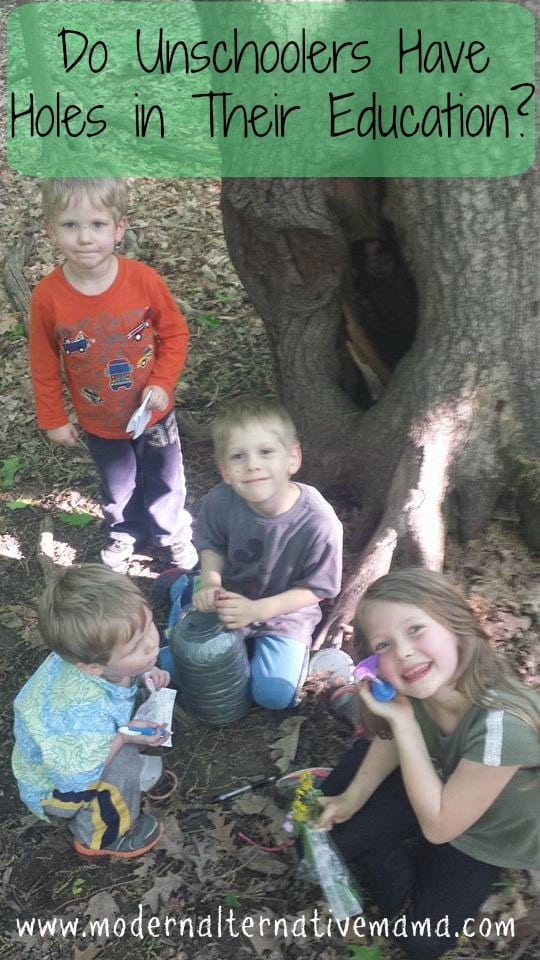
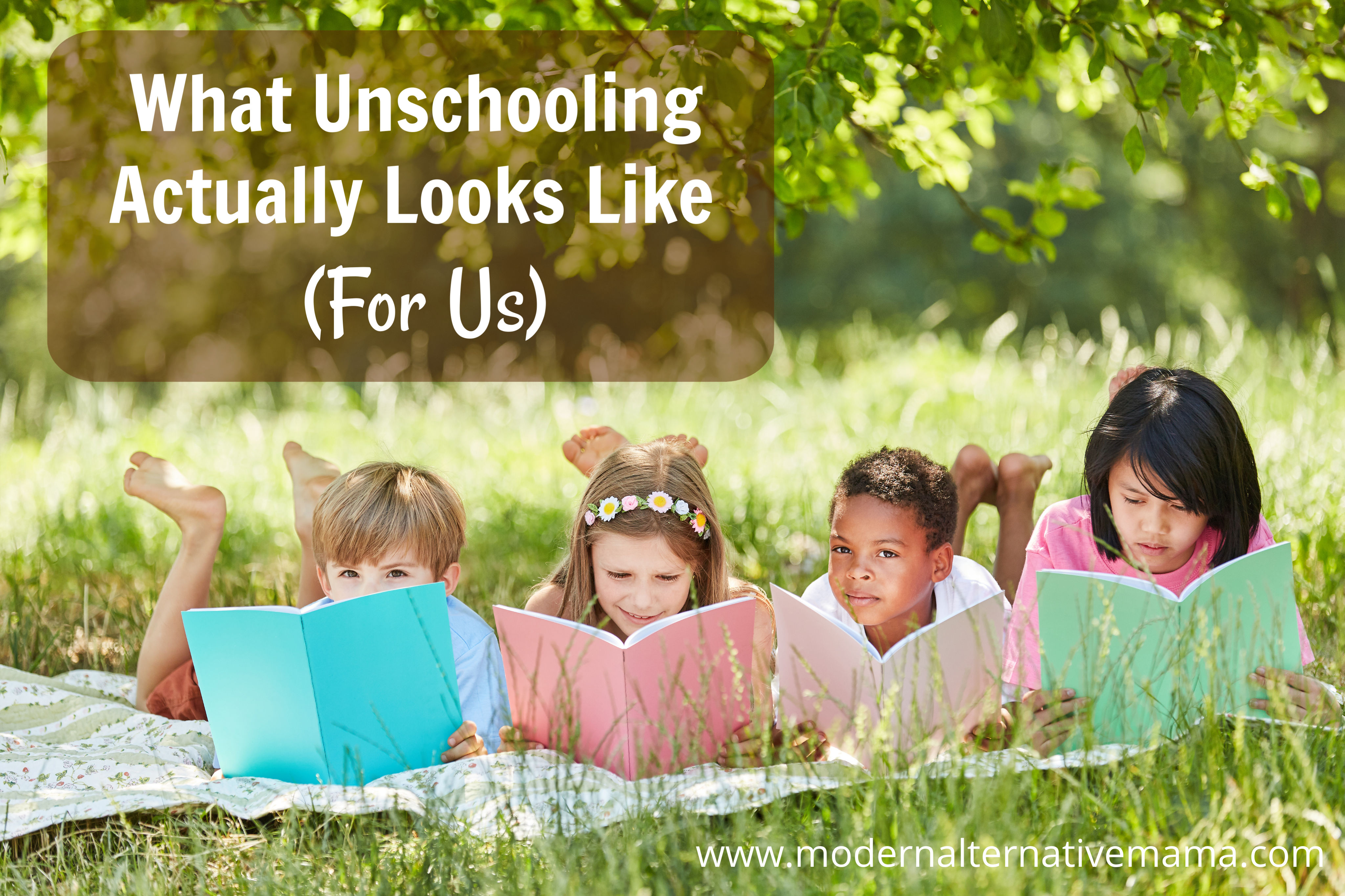
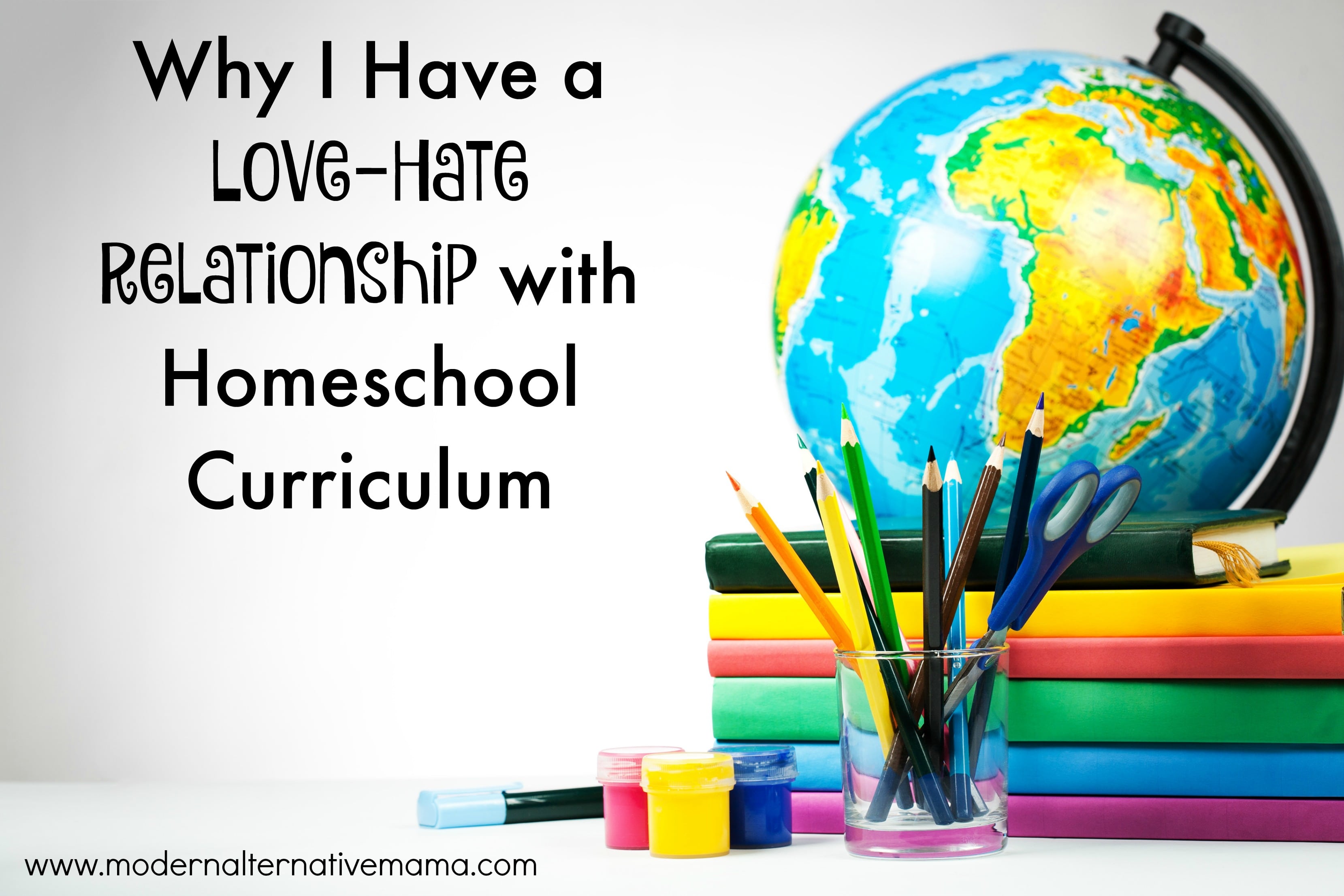
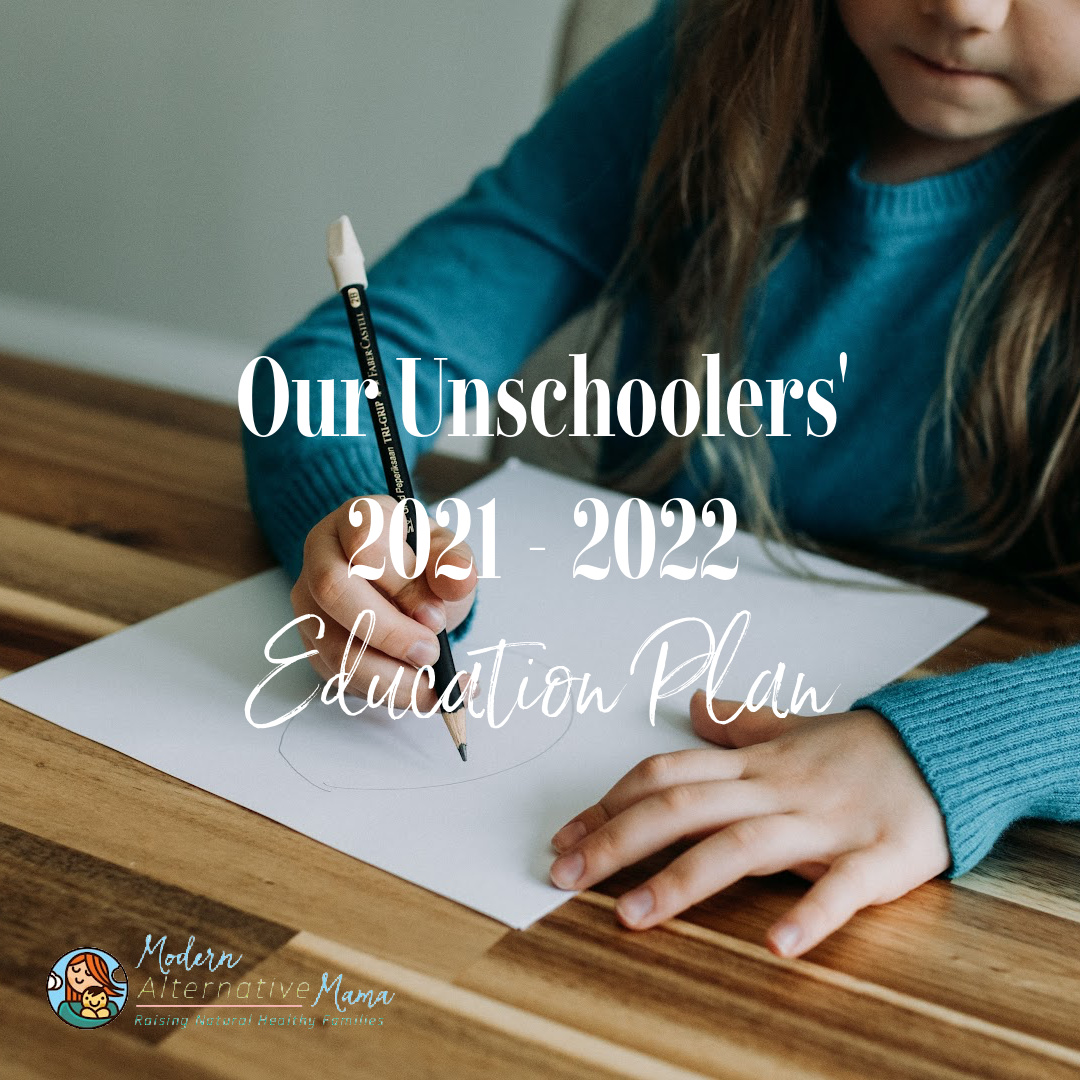
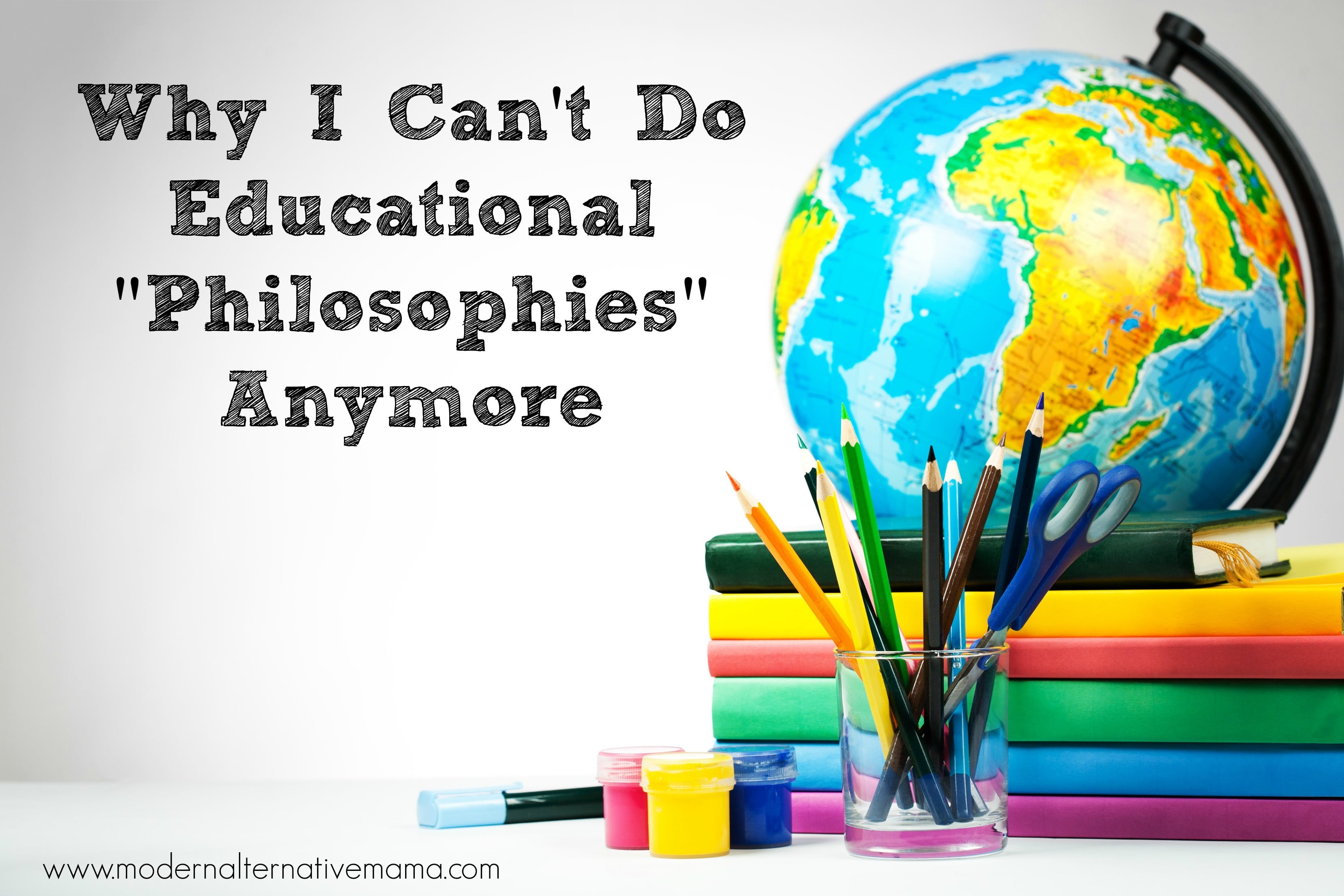

As usual, you make good points here to those unfamiliar to homeschooling or unschooling.
We definitely are leaning more towards unschooling our children. I tend to saywe haven’t “officially” started, but in reality we have just naturally.
The things Baby Boy knows and can do amaze even us. And largely that’s because we don’t do much, if any directed learning 🙂
I couldn’t have summed it up any better than you just did! Thanks so much for your insightful take on unschooling.
Child directed learning is an amazing thing to witness. My husband and I have been doing it for the last 12 years and we’re so grateful we broke away from the rigid school system (it was literally bringing our oldest son to his knees and changing his entire outlook for the worse). Now he and our younger kids have real life skills that are well-rounded and based on their individual geniuses. We like to call it “street smarts” because they seriously know how to interact successfully with people and the world around them, learn what they need to very quickly, and navigate life’s ups and downs with amazing skill and confidence.
Such a great post…I especially like the note re people that are products of conventional education and critical thinking. So true.
So after reading this I really want to give this a try! I’m thinking of starting it now since my son(age 5) has already completed his homeschool curriculum. This last year has been very difficult and I think it’s because of the workbooks. But anyways my main question is how does this work with the state standards?
It’s very easy in most states! We simply submit to the state our notice that we’re homeschooling (basic info, like names, addresses, etc.) and then include a curriculum outline. Since we don’t follow a formal curriculum, we just list several materials we may or may not use. This is considered “for informational purposes only” and is not approved by the state, so it’s quite easy to do. Check with HSLDA for your state’s laws.
I was wondering your view on allowing children to go to school. My husband and I see his children from other marriage struggling in certain subjects and areas, and have decided to homeschool the two we have together. We dont want them going to public school at all, but I am curious if it comes up and they want to try public school what you would do or say, or if it’s something you have even thought about.
When they’re older (at least middle school, maybe high school), we’ll let them choose. In the early, foundational years, they don’t have a choice. Although they don’t really want to go, anyway. Sometimes they say they do, but once I describe to them what the classroom is like and how long the days are, they say they don’t.
[…] So, to affirm, do unschoolers with all their freedoms, get a decent education? I found a great article talking about this from a mother named Kate, who also happens to have an education degree. Kate had three mains points that she addressed in her blog article. […]
OMG! you made it sooo clear to me, thank you so much! I’m starting this unschooling jurney and was a bit lost.
I’m sooo happy!!!
Amazing article! We have been homeschooling for two years and this is our first year that we have basically been just unschooling simply because that is just the way it’s ended up working. I was second guessing myself and continued to revert to structure/curriculum to only be met by resistance and complete upheaval in our home. I noticed “unschooling” is the best method for our kids when it’s what’s been happening during breaks all along. BIG AHA MOMENT!
Thanks for all the info! I recently started researched unschooling as an option for my daughter. I have a question you posted early in this article. Can unschooled children get into college? Have you answered this somewhere on your blog? I’d love to read it! 🙂 My daughter would like to be a vetrinarian when she grows up so being able to get into college is very important. 🙂 Thank you! 🙂
So, I have only heard about unschooling in the last few years, and as my two children are older (23 & 15) we are continuing the public education route. What we did as a family is move locations for the betterment of our children and a better school system. Our son now loves going to this high school. He gets to swim/dive with the school, as well as ROTC. He really enjoys his teachers and is just thriving there. That being said, when he is not in school, he is learning home improvements, car maintenance, welding, wood working, cooking and cleaning. Learning happens in many different ways. The most important thing is to ensure you, as the adult, are part of it. The children will get out of it, what you put into it.
FYi – I believe this is a great avenue for learning and believe you need to do what is right for your family and please don’t put down other family’s that choose differently than you.